US Treasury Secretary Janet Yellen to visit China
Upon mutual agreement between China and the US, US Treasury Secretary Janet Yellen will visit China from April 4-9, according to the Ministry of Finance.
Upon mutual agreement between China and the US, US Treasury Secretary Janet Yellen will visit China from April 4-9, according to the Ministry of Finance.

In the latest move by Washington in its strategy of "using Taiwan to contain the Chinese mainland," Laura Rosenberger, chair of the American Institute in Taiwan (AIT) met with Taiwan regional leader Tsai Ing-wen and vice leader Lai Ching-te during a week-long visit to the island.
As Lai is set to assume office as the next regional leader in the island in May, the ongoing trip, which is Rosenberger's fifth visit to the region since becoming AIT chair in March 2023, is expected to set some ground rules with the new leader and tighten Washington's control over the Democratic Progressive Party (DPP) during the transition of power. Maintaining the status quo in the Taiwan Straits will be most beneficial for American interests, according to mainland analysts.
Taiwan's local media reported that Lai met with Rosenberger on Monday and invited her to attend the inauguration ceremony on May 20. Rosenberger expressed her hope that Lai will continue to work to maintain the status quo across the Straits, according to Taiwan based-media.
Also, Rosenberger claimed that the US' commitment to the island is rock-solid, principled, and bipartisan.
During talks with Tsai and Lai, the American politician noted that it is hoped that Taiwan authorities can maintain sufficient self-defense capability.
Chinese analysts pointed out that for the US, while it tolerates some "Taiwan independence" forces in the island within certain limits, it does not want Taiwan separatists to seriously provoke the mainland, as that would jeopardize American interests.
Recently, the US has been promoting the idea of "a mainland attack on Taiwan," escalating tensions across the Straits. This theme was continued in Rosenberger's emphasis on Taiwan's efforts to enhance its defense resilience, analysts said.
It shows the US' desire for the island to purchase weapons, equipment, and technology, through which the US can not only make money but also promote its strategy of "using Taiwan to counter the Chinese mainland," Wang Jianmin, a senior cross-Straits expert at Minnan Normal University in Fujian, told the Global Times on Monday.
Wang said that the purpose of Rosenberger's Taiwan trip is obvious as Washington aims to tighten its control over Taiwan, while building influence over Taiwan's political landscape.
Following the recent regional election, the opposition Chinese Kuomintang (KMT) party has once again become the largest party in in the island's "legislature," according to media reports.
However, although Washington stressed its commitment to the island is rock-solid, a stalled US bill on military aid to Ukraine has raised concerns among DPP authorities. Chinese mainland analysts revealed that DPP authorities are worried about potentially being "abandoned" by the US in the future.
Under the guise of supporting Taiwan's "democracy," the US is actually wary of potential major incidents under Lai, and hopes to ensure that Taiwan does not stray beyond the boundaries set by the US or create further serious trouble in the Straits, Wang said.
In the event of a major crisis or conflict that is not in the interests of the US, maintaining the status quo across the Straits would be most beneficial to American interests, Wang explained.
The timing of Rosenberger's Taiwan visit coincided with former Taiwan regional leader Ma Ying-jeou's visit to the Chinese mainland but the two trips are expected to have the opposite effect, analysts noted.
Ma on Monday departed with a student delegation on an 11-day trip to the mainland, which he said will be used to deliver a message of friendship and peace, Taiwan's local media reported.
Ma's visit to the mainland is expected to help improve relations across the Straits, which is welcomed by people on both sides. Conversely, American politicians' visits to Taiwan violate the one-China principle, disrupt cross-Straits exchanges, hinder peaceful development of cross-Straits relations, and exacerbate tensions in the Straits, according to Wang.
The expert warned that it is likely that the frequency of mutual visits between US politicians and those from Taiwan will increase.
The trend toward closer and stronger illegal relations between the US and the island is unlikely to change in the short term, with cooperation in economy, technology, and security and military fields likely to increase, posing one of the biggest risks for the future of the Taiwan Straits, Wang said.

In recent days, the China Meteorological Administration issued a warning for a geomagnetic storm, sparking attention from the public. Many netizens jokingly blamed their insomnia, bad luck, and nightmares on the geomagnetic storm, claiming it was the cause of all their misfortunes.
But is this really the case? Expert answers may disappoint many.
In fact, geomagnetic storms do not have a significant impact on human health. "The Earth's magnetic field acts as a protective layer, preventing direct solar activity from affecting the Earth's surface. Many forms of energy and substances are blocked by the magnetic field," said Rong Zhaojin, researcher at the Institute of Geology and Geophysics of the Chinese Academy of Sciences, using the analogy of the Earth's magnetic field being like the immune system, with geomagnetic storms being a form of "immune response" to solar substances, Chinese media reported.
For example, regarding patients with implanted cardiovascular diseases and pacemakers, Yan Lai Xing, deputy chief physician of the cardiovascular department at Shulan Hospital in Hangzhou, East China's Zhejiang Province, stated that there is currently no research indicating that geomagnetic storms would affect the normal functioning of pacemakers.
"Furthermore, in the case of magnetic resonance imaging (MRI), the MRI machine itself has shielding devices to prevent electromagnetic interference," said Chu Yonghua, director of the clinical medical engineering department at the Second Affiliated Hospital of Zhejiang University.
During peak years of solar activity, the frequency of solar eruptions also increases. This year, the number of sunspots is expected to peak, leading to a higher frequency of geomagnetic storms.
Despite detailed explanations from experts, many netizens still claim that their recent physical discomfort and bad luck are due to the geomagnetic storm.
A netizen said, "I feel dizzy and sleepy, this must be the reason for the storm. I used to be a healthy girl." Another even joked, "I got a pay cut recently, and it must be due to the effects of the geomagnetic storm."
Experts suggest that the online discussion sparked by the geomagnetic storm reflects the public's curiosity and attention to natural phenomena, but also exposes some netizens' tendency to seek external factors to blame when facing life's challenges.
They advise netizens not to blindly follow trends or overinterpret such news. Instead, they should pay attention to information released through official channels to obtain more accurate and comprehensive scientific knowledge of the natural phenomenon.
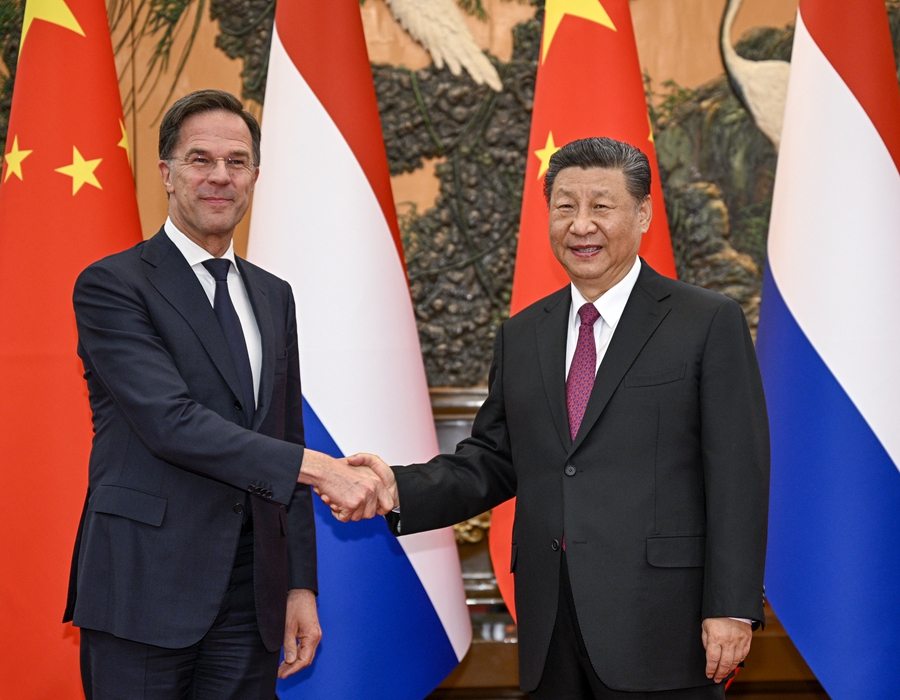
Chinese President Xi Jinping stressed economic globalization may encounter headwinds, but the historical trend will not change, during his Wednesday meeting with visiting Prime Minister of the Netherlands Mark Rutte, and reiterated China's commitment to mutual benefits and win-win approach.
Observers believe the high-level meeting and Rutte's two-day working visit from Tuesday can inject positive impetus into bilateral relations and stabilize the big picture amid challenges from the Dutch export ban on chip machines to China.
Against the backdrop of mounting pressure from the US and ASML's dilemma to run its business, the Dutch government should carefully balance the interests of different parties and remain pragmatic, analysts said, noting a country that flourished through free trade should not abandon such tradition.
Noting the Netherlands has become a veritable "gateway" for China-EU cooperation, Xi said China is ready to maintain exchanges at various levels with the Netherlands, adhere to communications and dialogue, and pursue mutual benefits and win-win results, according to the Xinhua News Agency.
There is no way out for "decoupling and de-risking," and open cooperation is the only choice, Xi said.
The Chinese people also have legitimate development rights, and no force can stop the pace of China's scientific and technological progress, said Xi, adding China will continue to pursue a win-win approach, open wider to the outside world at a high level, and share development dividends with all parties.
Rutte said that "decoupling" is not the policy option of Dutch government, as actions harming China's development interests will ultimately hurt the Netherlands.
Xi and Rutte last met on the sidelines of the G20 Summit in Bali in November 2022.
Dutch Trade and Development Minister Geoffrey van Leeuwen who is in the delegation said on Tuesday that defending the interests of ASML is his "number one" priority.
The high-level interaction between the two countries at this crucial juncture helps tackle kinks in the bilateral ties, stabilizing and injecting impetus into further development of the relationship, analysts said.
Zhao Junjie, a research fellow at the Institute of European Studies of the Chinese Academy of Social Sciences, told the Global Times on Wednesday that the Dutch government is walking a tightrope, as pressure from the US is mounting while ASML is demanding more support for its business.
The chip machine giant has threatened to leave the Netherlands, citing anti-migration policies. Observers believe export bans imposed under US pressure will also cast a shadow over the company's performance and add to the push.
Zhao pointed out that the bans not only harm the semiconductor giant and jeopardize China-Netherlands trade cooperation and economic ties, but also put a question mark on the country's business climate.
Despite the skirmish over chip machines, the two countries maintain pragmatic cooperation in many fields, including green and low-carbon economy, silver economy, and climate change response, analysts said.
China has granted Dutch citizens visa-free status for short trips since December 1, 2023 to facilitate personnel exchanges. Rutte on Wednesday also visited the prestigious Peking University and communicated with students.
During the Wednesday meeting, Xi urged the two sides to promote traditional cooperation in such fields as agriculture, water conservancy and energy, and tap the potential of cooperation in artificial intelligence, green transformation and silver economy, among others.
He also expressed the hope that the two countries will continue to take more measures to facilitate personnel exchanges and encourage educational, cultural and sub-national exchanges.
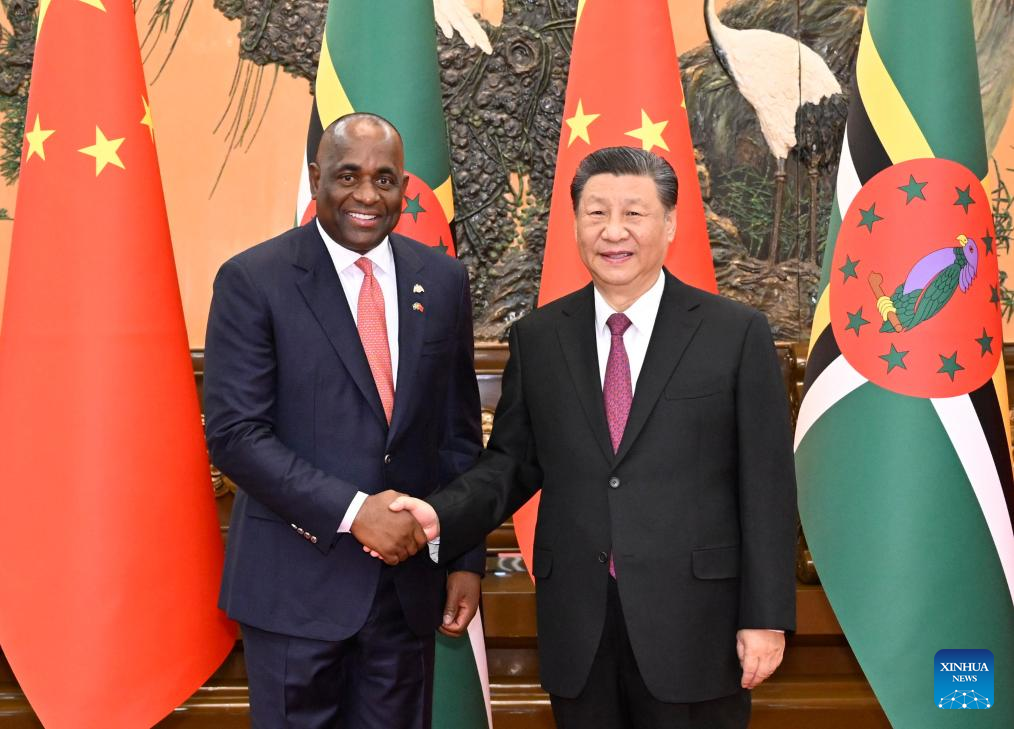
Nauru's political decision to adhere to the one-China principle and restore diplomatic ties with China in January is a move that conforms to the trend of history and the times, Chinese President Xi Jinping told visiting Nauruan President David Adeang on Monday in Beijing
Xi said China-Nauru relations have opened a new chapter in history, and China is ready to work with Nauru to create a better future of China-Nauru relations and bring more benefits to the two peoples. Friendship, whenever it is started, will have a bright future. Cooperation, whatever its size, will be productive as long as it is sincere, Xi said, the Xinhua News Agency reported.
Experts said that China's relationship with Nauru, which is based on mutual respect and support, is likely to serve as a model for the Pacific Island Countries (PICs). Moreover, the reason why the PICs have preferred deepening their relationship with China is that, unlike the West, China's approach is characterized by long-term commitment, equality, and genuine support for their development, rather than driven by geopolitical competition.
Xi said China welcomes Nauru as another country to sign the Belt and Road cooperation document with China.
He said China is ready to expand practical cooperation with Nauru in trade, investment and infrastructure construction, and provide assistance to Nauru for its independent and sustainable development without political strings attached.
Adeang said that Nauru highly appreciates China's consistent adherence to the principle of equality among all countries, and is willing to abide by the one-China principle, continuously deepen cooperation with China, take the resumption of diplomatic relations between Nauru and China as an important opportunity, observe mutual respect with China, enhance understanding, strengthen personnel exchanges and cooperation in various fields, learn from China's experience, and develop a fruitful and mutually beneficial partnership.
The two sides signed various documents on cooperation under the framework of the Belt and Road Initiative, Global Development Initiative and in the fields of economy and agriculture.
This is the first visit by a Nauruan president after the two countries resumed diplomatic ties in January 2024.
"China's support and attention to these countries has been long-standing and unwavering," Ning Tuanhui, an assistant research fellow at the China Institute of International Studies, told the Global Times on Monday. "In contrast, countries like the US have only recently begun to prioritize their engagement with the PICs, primarily as part of their geopolitical scheme to counter China," Ning said.
In addition, China has adhered to the principle of equality among nations, regardless of their size. The majority of these island countries are small in terms of landmass and population, making them easily overlooked in the international arena. But China has always treated them with respect and equality, which has earned wide recognition from the PICs, Ning noted.
Chen Hong, director of the Australian Studies Center of East China Normal University, said that the biggest difference is that China fully respects their sovereignty and historical traditions.
"It means not imposing our own political, economic, or social preferences, models, or frameworks on these countries. This is particularly crucial because Western countries often operate under a Eurocentric mind-set, believing that their institutions and practices are superior and must be imposed on the PICs. This lack of respect can lead to serious cultural and societal clashes," Chen told the Global Times on Monday.
China believes that providing tangible benefits to the local population is paramount. Within the framework of South-South cooperation, China has provided substantial assistance in areas such as infrastructure and public welfare. Many PICs have benefited from improved infrastructure and essential services like healthcare, particularly through initiatives like the Belt and Road Initiative.
A case in point is Nauru's largest harbor currently being constructed by Chinese companies. With parts of the project finished, oil tankers can now directly dock to unload oil there, opening a new chapter for the country.
The five-year project has also brought cutting-edge technologies and job opportunities to the island country, promoting the local economy by expanding its connectivity with the rest of the world.

China had 1.09 billion netizens as of December 2023, an increase of 24.8 million from the number in December 2022, bringing the internet penetration to 77.5 percent, according to a new report released by the China Internet Network Information Center (CNNIC) on Friday.
Data from the 53rd Statistical Report on China's Internet Development released by the CNNIC shows that the internet has been playing an important role in promoting new industrialization, developing new quality productive forces and assisting economic and social development, as the overall recovery and improvement of China's economy continue to consolidate.
Liu Yulin, director of the China Internet Network Information Center, told the Global Times on Friday that as one of the most important digital technology breakthroughs in 2023, generative artificial intelligence (AI) has become deeply integrated with the real economy. The number of AI enterprises in China has exceeded 4,400. With the strong promotion of AI and other digital technologies, the transformation of the real economy toward digitization, intelligentization and greenization has been accelerating continuously to empower economic and social development.
According to the report, more people have shared the benefits of the development of the internet as it has become more accessible.
In 2023, China continued to accelerate the popularization of information services and narrowed the digital divide, with the urban-rural internet gap further narrowing. As of December 2023, the internet penetration in rural areas reached 66.5 percent, increasing by 4.6 percentage points from December 2022. The number of internet users in rural areas reached 326 million, an increase of 17.88 million compared to December 2022. Besides, application scenarios have continued to increase as the network infrastructure construction in rural areas has advanced.
Meanwhile, the digital divide between different groups continued to narrow in 2023, with the access to digital life for the elderly and the disabled increasingly guaranteed. According to the report, 2,577 websites and applications commonly used by the elderly and the disabled have completed aging-friendly and barrier-free renovations, with over 140 million smartphones and smart TVs upgraded to be elderly-friendly.
The public service applications in terms of transportation and health services are accelerating their coverage. The scale of users of online car-hailing and internet hospitals increased by 90.57 million and 51.39 million compared with the number in December 2022, up 20.7 percent and 14.2 percent, respectively.
Zhang Xiao, deputy director of the China Internet Network Information Center, told the Global Times on Friday that netizens' demand for transportation and travel was fully released in 2023, with the scale of users of car-hailing and online travel booking services increasing by 80 million compared with 2022.
The online car-hailing regulatory information exchange system received over 9 billion order messages throughout the year, up 30.8 percent year-on-year. Indicators such as the number of travelers and tourism revenue during major holidays surpassed the figures from the same period in 2019.
The report also showed that the development of internet applications allowed for more consumption and development of the digital economy, helping to boost the recovery of China's economy.
According to Li Mingtao, chief e-commerce expert at China International Electronic Commerce Center, the scale of online shopping users in China increased to 915 million as of December of 2023, an increase of 69.67 million from December 2022, up 8.2 percent. This led to national online retail sales of 15.4 trillion yuan ($2.13 trillion) in 2023, contributing to the continuous 11-year leadership of online retail sales in the world.
According to Li, China's cross-border e-commerce maintained rapid growth in 2023, becoming an important new driver for foreign trade. The total import and export volume of cross-border e-commerce reached 2.38 trillion yuan for the whole year, an increase of 15.6 percent.
The report showed that entertainment and tourism consumption, characterized by immersive and cultural experiences, have seen accelerated recovery. As of December of 2023, the number of online travel booking users reached 509 million, an increase of 86.29 million compared with December 2022, representing a growth rate of 20.4 percent.
Domestic trendy products continued to constitute an important component of residents' online shopping consumption. Over the past six months, 58.3 percent of internet users have purchased such trendy products online.
China's online video environment also continues to improve, with content supply being constantly enriched.
Zhou Jie, deputy secretary-general of the China Netcasting Services Association, said on Friday that as of December 2023, the scale of online video users in China reached 1.06 billion, accounting for 97.7 percent of the overall internet users. Among the 24.8 million new internet users, 37.8 percent used online video applications when they used the internet for the first time, which was 21.7 percentage points higher than the second-ranking instant messaging (16.1 percent).
The report also showed the construction of digital infrastructure in China was further accelerated in 2023, with the number of IPv6 addresses reaching 68,042 blocks/32 and the registered number of ".cn" domain names growing to 20.13 million as of December 2023.
In terms of the Internet of Things (IoT), 3.37 million 5G base stations had been set up and there were 2.33 billion cellular IoT terminal users as of December 2023. The number of cellular IoT terminal users increased by 488 million compared with December 2022.
The high-quality development of mobile communication networks has driven innovation and development in various fields such as smart manufacturing, smart cities, rural revitalization and cultural tourism, providing a solid foundation and strong support for building a digital China.
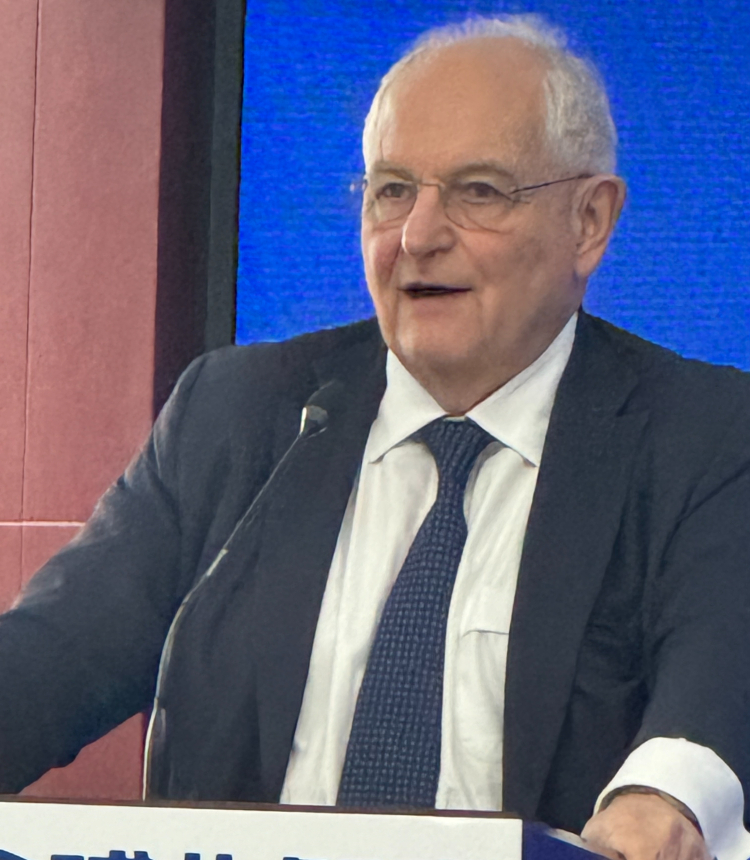
Compared with Japan in 1990s, China's economic growth potential is substantially greater. So, with the right policies, China should not end up like Japan, renowned British economist Martin Wolf, associate editor, and chief economics commentator at the Financial Times, told the Global Times in Beijing.
He suggested that China should reduce the national savings rate and stimulate consumption. And a key lesson is not to "allow deflation to set in," otherwise monetary policy will become very ineffective. If this happens, policymakers will be forced to use fiscal policies massively, which is very expensive.
Wolf made the remarks in an interview with the Global Times on the sidelines of a seminar on Globalization and the Chinese Economy organized by the think tank Center for China and Globalization (CCG).
"Today is a moment in Chinese economic history that may be quite important for the next 10 or 20 years," he said.
"China is, relatively speaking, much further from high-income status than Japan was in 1990. So its growth potential is substantially greater. There is much less reason for the productivity slowdown that occurred in Japan. In that sense, with the right policies, China should not end up like Japan," Wolf told the Global Times.
He pointed out that the similarity between Japan and China in history is that they both have very high savings rates. The saving rate stood at about 40 percent of its GDP at its peak in Japan. This is great for a rapidly developing manufacturing country building a modern economy from scratch, as these savings can be converted into investments when it grows at 10 percent.
However, when Japan became a high-income country and caught up with most of Europe, its savings rate still accounted for 35 percent of GDP, but the investment rate declined and the account surplus exploded.
At that time, Japan did not make the wise decision to reduce the savings rate in a timely fashion, but instead decided to expand domestic investment, aggressively lower interest rates, and expand credit, leading to Japan experiencing the largest real estate boom in world history, reaching its peak in 1990. However, this economic bubble burst in the 1990s. When the economic bubble collapsed, the Japanese government did not implement effective artificial stimulus, nor did it change the macroeconomic structure in the early 1990s, leading to deflation.
"This is the lesson from Japan's experience," Wolf told the Global Times.
"Do not allow deflation to set in. It's very important not to let it because then you've got falling prices. If you've got expectations of falling prices, monetary policy becomes very ineffective. You then are forced to use fiscal policies massively, which is very expensive," he said.
The British economist believes that a key goal of China's macroeconomic policy is to transform the country into a full, all-around, and high-income nation. Despite facing more challenges at present, this goal is still achievable.
He argues that in order to achieve this goal, an important task is to improve underlying productivity, namely Total Factor Productivity (TFP). TFP is an indicator that measures the ratio of total output to all factor inputs.
In recent years, China's total factor productivity has not been growing rapidly, mainly due to the country's previous high investment rates. However, in recent years, the investment rate has been slowing down, mainly due to declining profits and instances of "overinvestment" in some regions in previous years.
Wolf told the Global Times that China can seek new large-scale domestic investment projects that are efficient and productive, absorbing resources and savings that cannot currently be effectively absorbed. "In my view, the most plausible large-scale investment that is already happening is various forms of renewable energy."
He noted that China can also increase investment in manufacturing. However, it is important to be aware that investing in manufacturing may lead to overcapacity. If this excess capacity is exported to Europe or the US, it will face fierce resistance. At the same time, other developing markets are not that big and have a limit.
In the field of investment, He said that two issues need to be emphasized. First, as most of China's infrastructure has already been built, real estate will no longer play a significant role in investment.
Second, it is important to produce good "valuable GDP," which means generating GDP that actually benefits the current or future welfare of the Chinese people, rather than creating things that will never be used in reality.
The creation of useless GDP should be avoided, he warned. For instance, if you build vast numbers of tower blocks which are not occupied, that is not productive GDP," he said.
Compared with investment, the more important thing is to drive up consumption, he stressed to the Global Times.
Currently, China's national savings rate is the highest in the history of the world for a country at this level of development and size, comparably.
"The national savings rate is too high to be productively absorbed in the economy at current levels of GDP. There is no plausible investment with one exception which can offset that. And the last one that did absorb a lot of these savings is this huge real estate building boom. But that's pretty clearly coming to an end," he told the Global Times.
Therefore, there is an urgency to boost consumption. "Consumption has to rise and the drivers [for economic growth] will be consumption because that's what they've been for every country that got to the sort of level of GDP that China has now. The question is only how it's done."
According to him, the consumption could be public consumption or private consumption. Public consumption, it means taxation, while for the private consumption, it means some combination of lower household savings and redistribution of income.
"This is going to be fantastically difficult," he said, adding that driving consumptions can be done in many different ways.
When discussing globalization and China's role in the world economy, Wolf believes that the fundamental driving forces of the process of global economic integration over the last two centuries have been the resource and cost advantages, transportation and communication technology innovations, and policy and political openness.
In recent years, the vitality of these driving factors has weakened, leading to a slowdown in globalization. However, the end of the "hyper-globalization" era does not mean the end of globalization. Despite facing pressures from economic adjustment costs and tensions among major powers, the momentum of globalization remains strong.
In recent years, Western companies have increasingly focused on political risks and sought to diversify supply chains for hedging purposes, but this does not mean de-globalization. The current issue lies in whether a framework of trust and cooperation can be established, for which both China and the West must work very hard, he noted.
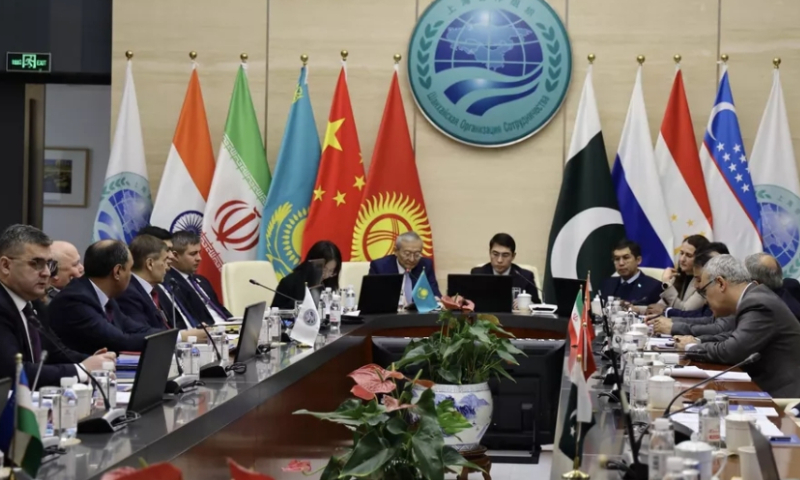
The upcoming elections in Pakistan do not affect its interaction with the Shanghai Cooperation Organization (SCO) or other international organizations. The SCO works with states, regardless of the government in power, said Pakistan's Director General SCO at the Ministry of Foreign Affairs, Altamash Wazir Khan.
Khan also told the Global Times that Pakistan's relationship with Iran was not a topic of discussion during the SCO meetings this time round, as there was a full agenda of about 30 issues to cover. But he highlighted the de-escalation of tensions between Pakistan and Iran, underscored by the Iranian Foreign Minister's recent visit to Pakistan.
Iran's Foreign Minister Hossein Amir-Abdollahian recently visited Pakistan, when both sides announced the establishment of a high-level consultative mechanism to oversee the progress in various areas of cooperation between the two countries, including counter-terrorism, Xinhua reported.
Khan made the above remarks during a recent meeting between coordinators of the SCO member countries and media representatives in Beijing.
The Election Commission of Pakistan had previously announced that February 8 would be the official date for the general elections in the country, read a Xinhua report. The Pakistani coordinator emphasized that the election results will not influence Pakistan's relations with the SCO and other international organizations.
He emphasized that Pakistan's main focus in the SCO is on mutual benefit and economic development, as well as humanitarian cooperation. Security is also a priority, but bilateral discussions on sensitive issues are avoided.
Regarding the SCO development bank, Khan said that experts are currently working on the drafts, and while it may take some time, progress is being made. He said that the idea is not just about constructing a building, but about creating an entire financial system which takes time for it to be realized.
When asked about Pakistan's priorities at the SCO, Khan mentioned that Pakistan's focus is on economic cooperation, financial cooperation, humanitarian cooperation, and connectivity. Connectivity not only includes physical infrastructure like roads and railways but also connectivity among people through digital platforms.
Talking about the role that the SCO can play in the Afghan issue, he mentioned that official contact with Afghanistan is currently not possible. The SCO operates on the basis of consensus, and official contact cannot be established until all member states recognize the Taliban government. Nonetheless, Pakistan does participate in meetings related to Afghanistan.
The SCO currently has 9 member states, including China, Russia, Kazakhstan, Kyrgyzstan, Tajikistan, Uzbekistan, India, Pakistan, and Iran, as well as 3 observer states, including Afghanistan, Belarus, and Mongolia.
From January 31 to February 1, the SCO held the meeting of the SCO National Coordinators Council in Beijing. The National Coordinators Council is the coordinating and managing body for the daily activities of the SCO. This council is responsible for necessary preparations for the organization's meetings of heads of state, heads of government, and foreign ministers, according to media reports.
Talking about plans for the coming months, he revealed that Pakistan is set to host over 80 events until November this year, emphasizing various aspects of collaboration within the SCO framework. Since assuming the chairmanship in October of the preceding year, Pakistan has efficiently executed more than 20 events within the last two and a half months.
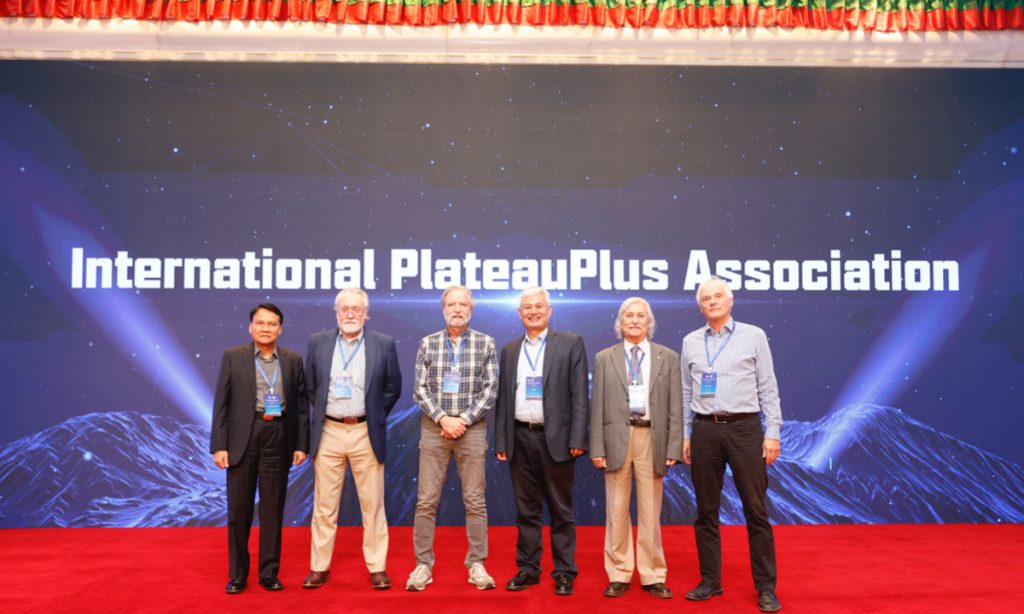
Witnessed by 150 scientists from eight countries, the International PlateauPlus Association (PlateauPlus) was established Thursday in Beijing, during the PlateauPlus Workshop held by the Institute of Tibetan Plateau Research (ITP) and the Chinese Academy of Sciences (CAS).
PlateauPlus is a platform proposed by Chinese scientists that aims to unite top research institutions and scientists from more than 20 countries across the globe where giant plateaus are located. It is designated to serve as an international platform for mega plateau research and to develop a new model of interdisciplinary and cross-regional global cooperation in Earth system science, read a statement the ITPCAS sent to the Global Times.
The association will focus on the Qinghai-Tibet Plateau and Iranian Plateau in Asia, the Colorado Plateau and Columbia Plateau in North America, the Altiplano Plateau in South America, the East African Plateau in Africa and the Alps in Europe. It will conduct research on the formation and evolution of plateaus, environmental effects, biodiversity changes and human adaptation. It will also decipher the coupling mechanism between plateau uplift and surface environmental changes, and reveal the changes in plateau habitability and human social evolution, according to the ITPCAS.
Mega plateaus have significant impacts on the environment, biodiversity, and human survival. Previously, the ITPCAS mainly focused on studying the Qinghai-Tibet Plateau, which has also attracted many foreign scientists. However, besides the Qinghai-Tibet Plateau, other mega plateaus around the world also have a tremendous impact on these aspects. So it's a good idea to unite scientists all around the world to jointly examine all these mega plateaus and find out what factors have played a vital role or how these plateaus affect each other in shaping the current environmental landscape, rivers as well as human migration and adaptation, Ding Lin, an ITP researcher and Academician of the CAS and one of the initiators of PlateauPlus, told the Global Times.
"Although aspects of the orographic development of the Tibetan region are still actively debated, collaboration across disciplines and testing ideas within the rigor of mathematical models are honing our understanding of the highly complex natural processes inherent to the Tibetan geo/ecosystem. If humans are ever going to manage our planet in a responsible and informed way, then the lessons we have learned from Tibetan Plateau research must be applied more widely to other orographically complex systems. These lessons are not just those relating to the science itself, but how we do the research, how we improve our methodologies, how we nurture international collaboration and integrate local knowledge with broader global perspectives," said Robert Spicer, emeritus professor of Earth Sciences at The Open University in the UK.
"We now have a magnificent toolbox of methodologies and ideas that can be used to investigate other plateaus worldwide, so it is time to explore and integrate plateau system research globally," Spicer said. He noted that as a world leader in science, China is very attractive for foreign scientists.
During the two-day PlateauPlus Workshop, global scientists discussed the formation and evolution of plateaus, environmental effects, biodiversity changes, and human adaptation.
Ding said that in the future the ITPCAS will host workshops in different countries, fostering a truly global perspective.
Field excursions in various global mega plateaus will be a crucial part of the journey, offering hands-on experience and deeper insights. A key focus will be engaging more and more local institutions, especially from regions like East Africa and South America, which are currently underrepresented, according to Ding.
Strengthening these connections is essential for a more comprehensive understanding and inclusive approach to the research, he noted.

The US' so-called Uyghur Forced Labor Prevention Act (UFLPA) is one of the most notorious laws of the 21st century. It is essentially a tool used by US politicians to destabilize Xinjiang and curb China's development, a Chinese Foreign Ministry spokesperson said on Friday, responding to US suspension of garment imports from the Philippines on suspicion that cotton used is involved in "forced labor" in Xinjiang.
So-called "forced labor" in Xinjiang is the lie of the century concocted by anti-China forces to create forced unemployment and poverty in Northwest China's Xinjiang Uygur Autonomous Region, Wang Wenbin, spokesperson for the Chinese Ministry of Foreign Affairs, said on Friday during a routine press conference.
"Such a lie is a tool used by US politicians to destabilize Xinjiang and curb China's development," said Wang.
Wang shared several examples during the press conference, which clearly showed that what the US has done on Xinjiang violated human rights under the banner of "human rights protection."
One example was a private clothing company in Xinjiang, which employed more than 2,200 people as of the end of 2018, with ethnic minority employees accounting for more than 95 percent. However, due to the impact of the US and Western sanctions, the main partners of the company have cancelled all orders in 2019, resulting in direct losses of over 10 million yuan ($1.4 million) and a reduction in employees to less than 500 people. At present, most of the factory and equipment owned by the enterprise remains idle, and it is barely able to maintain its operation through domestic orders.
Another example is a Xinjiang hair ornament production enterprise which saw its order volume decrease by 40 percent in 2023 compared to the previous year, after being sanctioned by the US. The company's production and operations have continued to deteriorate.
While it used to produce 50 million hair ornament products annually, with an annual export volume reaching $30 million in 2022, it also made a great contribution to solving local employment.
Wang also cited a villager living in Xinjiang's Kashi, who found a job in a wholly foreign-funded enterprise doing trade in Central China's Hunan in September 2019, with a monthly salary of 5,000 yuan. In 2020, due to the impact of the US sanctions, the enterprise canceled the labor contract with the villager, which forced the villager to return to his/her hometown to make a living, and the monthly income was greatly reduced.
In addition, for the sake of so-called compliance, some US companies have unilaterally terminated the supply of medical products purchased from Xinjiang, seriously affecting the right to life and health of the Xinjiang people, Wang noted.
"Facts have proved that the so-called UFLPA is in essence a tool used by US politicians to destabilize Xinjiang and curb China's development. It not only seriously infringes on the human rights of the people in Xinjiang, but also seriously disrupts the stability of the global industrial and supply chain, and seriously undermines international economic and trade rules. It is one of the most notorious evil laws of the 21st century," the spokesperson said.
Wang also called on the international community to firmly resist the wrongful actions of the US, which smears other countries, interferes in their internal affairs, oppresses their enterprises and stifles their development under the pretext of "human rights." China will continue to firmly safeguard the legitimate rights and interests of Chinese enterprises.